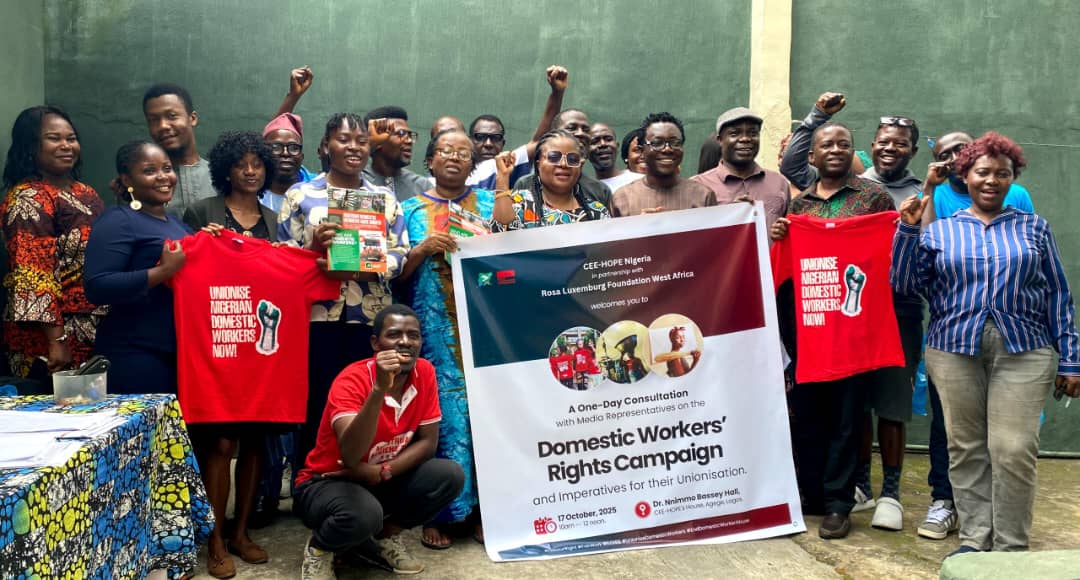Nigeria adopted the ILO Convention 189 in 2011 to uphold the dignity of its approximately four million domestic workers, but has yet to ratify or implement it. Fourteen years of inaction, combined with widespread abuse and poor working conditions, underscore the urgent need for a strong legal framework. Gloria Nwafor writes.
Eleven-year-old Nnamdi Offor has left his parents in the east to come live with his well-to-do uncle and family in Lagos, with the hope of getting a quality education, which his parents could not afford.
However, his dream of going to school was cut short, and he was treated as a domestic worker, while the children of his uncle attended the most expensive school within their locality.
During school hours, Nnamdi stayed at home to sell ice used to chill drinks and water, and also filled up the cold room and deep freezers with the water bags for next-day sales. The area where he lived used to have a constant power supply, through which his guardians made extra income through the sale of ice blocks, and Nnamdi was the person they could use to carry out the task while they went about their respective businesses, thereby denying Nnamdi his right to education.
Also, 13-year-old Judith Benson from Benue State came to Lagos as a domestic worker through an agent, who connected her with her employer. During her one year of stay, she was severely abused and molested by the children of her employer. Although her guardian registered her in school, she worked tirelessly as a house help. She goes to school very late, and also goes to bed as late as 11p.m. and wakes up as early as 4:30 a.m.
Nnamdi and Judith are a few of the domestic workers who have not been treated right, especially with the absence of a legal framework to hold their guardians accountable.
Most of them are threatened not to speak up when abused, with data showing that about 70 per cent of domestic workers have experienced different kinds of abuse, either sexually or physically assaulted.
By definition, a domestic worker is someone employed to perform household tasks within a private home, ranging from cleaning, cooking, washing clothes, caring for children, the sick and elderly, gardening, driving, security, and running other errands.
Some are live-in workers, while others visit the homes to work and return to their places at the end of the day. Sometimes they include adopted relatives who are most of the time unpaid.
According to the ILO, there are 75.6 million domestic workers globally, and 57.6 million of them are women. In Nigeria, there are four million domestic workers.
A study on domestic workers in Nigeria by CEE-HOPE Nigeria in conjunction with Rosa Luxemburg Foundation West Africa, showed that 61 per cent of Nigerian domestic workers are females, while 18 per cent of them are children under 18. These workers earn less than N30,000 monthly.
The study showed that parents typically hand over their children to richer relatives and friends, especially those living in the cities, to do their domestic work in exchange for the basic needs of the children, including sponsoring their education.
While the amount earned is insufficient for the workers to meet their basic needs due to the high inflationary trend in the country, some are not paid in cash; their employers pay them in kind by giving them used clothes, leftover food, and other items.
For some, especially the underage ones, their wages are shared between their parents in the villages and the agents who brought them to the city, with little or nothing left for them.
Apart from a little or no pay situation, the workers are exposed to different kinds of abuse, and they do more work than normal, and also work overtime with no rest.
The study showed that only 15 per cent of domestic workers in Nigeria have a binding contract that stipulates their work description, work hours, and wages.
While over 80 per cent of them have no contract or claim any right, they are unjustly sacked without compensation, adequate notice, or opportunity to demand fair treatment.
ILO Convention 198 clearly spells out the rights and benefits of domestic workers globally as pertaining to their human and labour rights. These include forbidding underage workers, specifying working hours, minimum wage, zero abuse, whether physical, verbal, sexual, etc, the right to form and belong to unions and interest groups, and generally fair and dignified working conditions/environment.
Some unions are already active in African countries like Kenya and South Africa, and in countries like the United Arab Emirates, Bangladesh, and India.
In these countries, domestic workers are kings, courtesy of their unions.
While Nigeria is yet to domesticate C189, there is a push from different quarters for the Nigerian government to implement it, to give massive relief to domestic workers, and many of the gross abuses and fatalities would be minimised.
The absence of legal protection causes psychological, physical, social, and economic abuse of the workers.
Currently, there are two key bills before the National Assembly and, if passed, would transform the landscape for domestic workers in Nigeria.
In the House of Representatives, HB.1765: A Bill for an Act to Domesticate the “Domestic Workers Bill of Rights” sponsored by Hon. Akin Alabi, in Establishing Minimum Employment Standards, Ensuring the Protection and Welfare of Domestic Workers, and for Related Matters, has passed second reading.
In the Senate, also, A Bill for an Act to Regulate and Formalise the Employment of Domestic Workers, Apprenticeships, Interns and Other Informal Sector Employees and to Empower the National Directorate of Employment to Issue Licenses and Monitor Privately Owned Employment Agencies in Nigeria, 2025, sponsored by Senator Sani Musa, is the companion legislation being considered.
According to labour experts, the bills represent a historic opportunity. They argued that if passed, they would enshrine fair wages, safe working conditions, protection from abuse, access to social security, and enforceable legal recourse for domestic workers.
Founder/Executive Director, CEE-HOPE, Betty Abah, said they will formalise an entire sector that has long existed in legal limbo, bringing accountability, oversight, and dignity to millions who work behind closed doors, as well as strengthening Nigeria’s image internationally as a country committed to labour justice and human rights.
Equally important, she argued, is the unionisation of domestic workers.
She stressed that when workers come together collectively, they can negotiate for better terms, resist exploitation, and build solidarity.
According to her, without a union, domestic workers remain isolated and voiceless, but with one, they gain structure, voice, and protection.
“We have seen domestic worker unions in other countries push meaningful improvements in wages, working hours, and respect. Nigeria must embrace this path immediately.
“With a smooth passage of the new bill into law and domestication of Convention 189, everyone, including providers and employers of domestic labour, stands to gain immensely.
“It is worth mentioning as well that the Senate President, Senator Godswill Akpabio, in a gesture of goodwill, has given his support to the Bill and promised that the Senate would ensure that Domestic Workers benefit from the N70,000 National Minimum Wage,” she said.
She faulted the National Agency for the Prohibition of Trafficking in Persons (NAPTIP), an agency of the Federal Government responsible for addressing the scourge of trafficking in persons, for not being proactive enough, most of the time working on “compassion fatigue”.
Seeking the media as partners to drive the change, Abah added, “Domestic workers are not servants—they are workers. Protecting their rights through legislation, unionisation, and media advocacy is not charity—it is justice. It is equity. It is acknowledging their indispensable contribution to our homes, our families, and our nation.”
Speaking on the matter, a media consultant and trainer, Monday Ashibogwu, cited cases of inhuman treatment, stating that with a proper legislative framework, nobody would take domestic workers for granted.
“Rights of a Nigerian worker should not be negotiable. It is not a favour but a service rendered and should not be taken for granted,” he said.
A child protection expert and former state coordinator of Child Protection Network (CPN), Lagos State chapter, Ngozi Okoro, lamented the hurdles most of them go through in rescuing some of the children who are being maltreated.
She called for the prosecution of perpetrators who abuse and harass children and also training of police officers, alleging that their investigations had shown that the perpetrators most of the time bribe the police to cut corners and sweep some cases, especially on abuse of minors under the carpet.
According to her, every human has the right, able or disabled.
State Auditor, Nigeria Labour Congress (NLC), Olurotimi Awojide, called for the need for family planning for parents to be able to give birth to the number of children they can cater for.
Frontline Human Rights Activist, Taiwo Soweto, lamented the height of social injustice in the domestic workers’ space and the need for more visibility.
He equally called for quick regulation of the employment pattern for their protection, adding that the government has continued to ignore the ratification of C189.
Media trainer and journalist, Lekan Otufodunrin, urged journalists to speak more to power and also amplify the voices of domestic workers, who are just as vulnerable.






